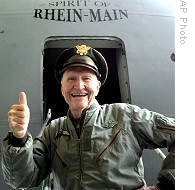VOA标准英语2008年-Berlin Airlift Remembered After 60 Years
搜索关注在线英语听力室公众号:tingroom,领取免费英语资料大礼包。
(单词翻译)
By Kent Klein
Washington
20 June 2008
June 26, 2008 marks the 60th anniversary of the Berlin Airlift - one of the biggest humanitarian1 operations ever, and a turning point in the Cold War. VOA's Kent Klein looks back at the Berlin Airlift, with a man who took part in it, and a woman who is still grateful for it.
 |
| Air Force pilot Col. Gail Halvorsen (File) |
Retired2 U.S. Air Force Colonel Gail Halvorsen drops candy to children from a transport plane that flew in the Berlin Airlift. He does this at air shows around the United States, like this one at Andrews Air Force Base in Maryland. He is known as "The Candy Bomber3."
"We fly this 'Spirit of Freedom,' this C-54, to remind old people what it was about, and educate the young people of America what freedom meant to the kids in Berlin," he explains.
Sixty years ago, Halvorsen was a part of the Berlin Airlift - one of the largest humanitarian missions in history, and one of the first crises of the Cold War.
After World War II, a divided Berlin was surrounded by Soviet4-occupied eastern Germany. In May, 1948, the Soviet Union blocked U.S., British and French access to the western part of the city, hoping the Allies would abandon it.
The two million people of West Berlin had only 35 days' worth of food. On June 26, the U.S. and Britain started flying food, coal and other vital supplies to them.
Halvorsen is one of the best-known pilots of the Airlift. He dropped American chocolate bars, tied to small parachutes, to the children of West Berlin. Halvorsen says the idea occurred to him as he was talking with some children across a barbed-wire fence at a Berlin airport.
"I wanted to give them something, because they did not beg," he explains. "I only had two sticks of gum, broke them in half, four pieces through the barbed wire. Kids with half a stick looked like they got a million bucks5."
 |
| Undated file photo shows Berlin children sitting on fence of Tempelhof airport watching so called 'Raisin6 Bomber' approaching for landing |
One child who was grateful for the arrival of the Airlift was Helga Stege. Today, she's Helga Johnson, a U.S. citizen who vividly7 remembers living in a partially8 bombed-out apartment building in postwar Berlin.
"We really had nothing to eat. There was nothing available," Johnson recalls. "We had some old potatoes or something. We were hungry all the time. We went to bed dressed because we had no coal to heat the house. Some of the windows were broken."
And she recalls the feeling of hope when she heard the sound of American and British transport planes landing.
"We were so grateful to the Americans that they helped us," she says. "You have to remember, we were the enemy, and the war was only over three years, and then the Americans helped us to stay alive."
Johnson also travels to air shows on the transport plane called the "Spirit of Freedom," which serves as a traveling museum of the Berlin Airlift.
Washington's International Spy Museum has an exhibit on Berlin's role in the Cold War. Executive Director Peter Earnest, a retired CIA agent, says the Berlin Airlift altered the course of the Cold War.
"It was just that the Blockade was so dramatic, so sudden and provoked such a sharp reply that it clearly sharpened the formation of those opposing blocs9, if you will. And in that sense, I think, it played a key role in the Cold War," Earnest says.
Halvorsen says the Berlin Airlift stopped Soviet leader Joseph Stalin from marching westward10, by turning world opinion against him.
"He had to take West Berlin before he went to West Germany," notes Halvorsen. "He got stopped in West Berlin by world opinion, because he was starving people, and the British, French and Americans were feeding them."
The Soviets11 ended their blockade of Berlin in May, 1949. The airlift ended in September.
Andrei Cherny, who's written a book about the Berlin Airlift, titled The Candy Bombers12, says the airlift set the course for the rest of the Cold War.
"The Soviets, after that point, never gained a single inch of territory in Europe, and never really tried again after that," he says.
In 15 months, the U.S. and Britain had delivered more than 2.3 million tons of food and supplies on more than 278,000 flights into Berlin. A total of 101 people died in the operation. The transport planes together flew more than 148 million kilometers, almost the distance between the earth and the sun.
Andrei Cherny says the pilots of the Berlin Airlift earned their place in history.
"This is a story, really, about when America was at its best, when we were doing the right things in the world, when people all over the world looked to us as a source of goodness and decency13 and humanity," he says.




